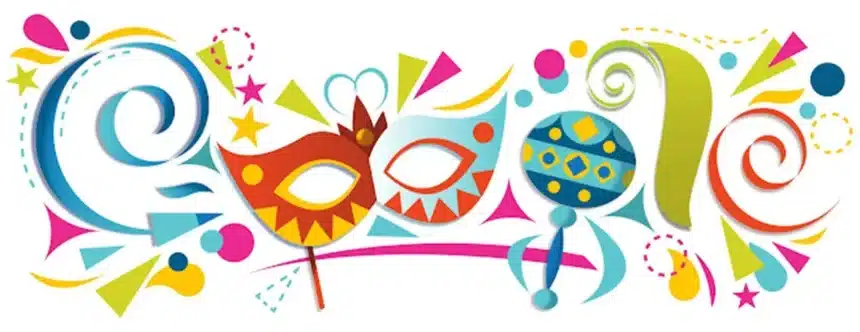Image Courtesy: Google Doodle
The Barranquilla Carnival, also known as the Barranquilla Carnival of Colombia, is a major cultural festival that takes place annually in the city of Barranquilla, Colombia. It is one of the largest and most vibrant carnivals in South America and is widely considered to be one of the most important cultural events in Colombia.
The Barranquilla Carnival is a celebration of music, dance, and color, with a variety of cultural and artistic events taking place throughout the city, including parades, concerts, and street parties. The festival is characterized by its lively atmosphere, with participants dressed in colorful costumes, dancing to the rhythm of traditional Colombian music, and celebrating the rich cultural heritage of the city and the country.
The carnival is celebrated during the four days before the ash wednesday, a holy day of prayer and fasting in many Western Christian denominations. People party widely and get disguised as an act of fun and a lack of inhibition. During this time, Barranquilla people and foreigners coming in the city submerse themselves in the collective joy, drinking and dancing.
History of Barranquilla Carnival
The Barranquilla Carnival is a major cultural festival that has its roots in the 19th century, when Spanish and African immigrants brought their cultural traditions to Colombia. Over the years, the festival has evolved into one of the largest and most vibrant carnivals in South America, attracting thousands of visitors from around the world.
The first official carnival in Barranquilla took place in 1903, and it has been held annually ever since. During the festival, the city is transformed into a massive celebration of music, dance, and color, with participants dressed in elaborate costumes and dancing to the rhythm of traditional Colombian music.
Throughout the 20th century, the Barranquilla Carnival continued to grow in popularity and became a symbol of the city’s cultural heritage. In the 1950s, the festival began to incorporate elements of African and indigenous culture, creating a unique and diverse celebration that reflects the rich cultural mix of the city and the country.
In the 1980s, the Barranquilla Carnival was recognized as a Masterpiece of the Oral and Intangible Heritage of Humanity by UNESCO, a testament to its cultural significance and importance. Today, the festival continues to be a major cultural event in Colombia, attracting thousands of visitors each year and serving as a celebration of the country’s rich and diverse cultural heritage.
The Barranquilla Carnival is an expression of the rich cultural and artistic traditions of Colombia, and it stands as a testament to the country’s long and proud history of music, dance, and artistic expression.
Significance of Barranquilla Carnival
The Barranquilla Carnival is one of the largest and most significant cultural festivals in South America and holds a significant place in the cultural heritage of Colombia. The festival has a number of important significances, including:
- Cultural Expression: The Barranquilla Carnival is a celebration of music, dance, and color, and serves as a showcase for the rich cultural heritage of the city and the country. The festival provides a platform for artists, musicians, and performers to showcase their talents and to celebrate their cultural traditions.
- Economic Impact: The Barranquilla Carnival is a major economic driver for the city and the region, attracting thousands of visitors each year and generating significant economic activity. The festival also provides employment and income opportunities for local artists, musicians, and performers.
- National Identity: The Barranquilla Carnival is a symbol of the rich cultural heritage of Colombia and plays a significant role in shaping the national identity of the country. The festival serves as a celebration of the country’s diverse cultural traditions and is a source of pride for the Colombian people.
- Cultural Tourism: The Barranquilla Carnival is a major tourist attraction, attracting visitors from around the world who come to experience the vibrant culture and festive atmosphere of the city and the country. The festival plays an important role in promoting cultural tourism and in generating income for the local economy.
- UNESCO Recognition: The Barranquilla Carnival has been recognized as a Masterpiece of the Oral and Intangible Heritage of Humanity by UNESCO, a testament to its cultural significance and importance. The recognition serves as a symbol of the festival’s cultural value and provides a platform for promoting and preserving the cultural heritage of the city and the country.
On 9 February 2013, Google celebrated Barranquilla Carnival with a doodle.

